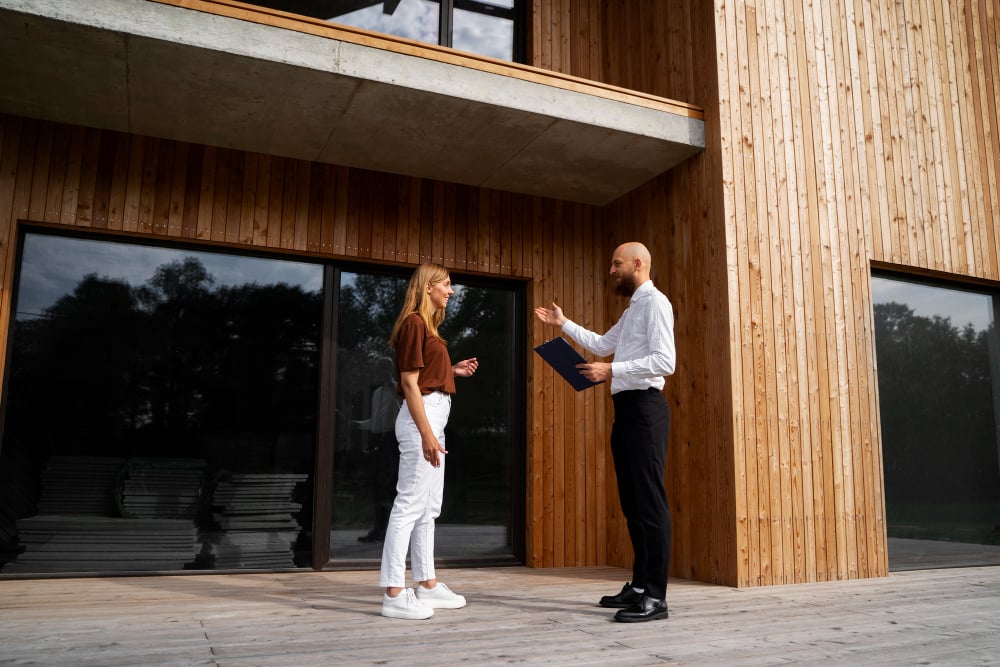So you’ve decided to buy a house in the Netherlands! You know your borrowing capacity, you know where you want to live, and you know you’ve found yourself the perfect home. But you also know about those extra costs, right?
We hate to rain on your parade — but there are a number of significantly important extra costs that you need to consider before you go ahead and buy a house in the Netherlands. Let’s run through them.
The valuation report (Taxatierapport)
The first thing you may decide to do once you’ve set your sights on your dream home is to get the property valued. In the Netherlands, this is called getting a taxatierapport and, of course, it’s going to cost you some money.

That being said, it’s definitely a worthwhile investment. While it’s very popular in the Netherlands to ask a hefty sum for a home, you don’t want to be downright swindled.
READ MORE | The dos and don’ts of buying a house in the Netherlands, according to the experts
By opting to get a taxatierapport, you’re given a better understanding of the actual value of the home (which can also help when comparing the house to other potentials!) The last thing you want is to dish out your hard-earned money on a property that isn’t valued correctly.
💰 How much does it cost? Valuation reports in the Netherlands are ever-changing due to a number of factors. As a result, you can expect a report to set you back anywhere between €750 – €1000 and upwards.
⏰ When do you have to pay it? You must pay this cost before the house is evaluated.
💶 Is it tax-deductible? Yes.
👇 Is it always necessary? Not strictly. However, in most cases, before a mortgage company will give you a mortgage, it is required that you get the property valued.
The building report (bouwkundig rapport)
A bouwkunding rapport (building report) is a constructional report of the house. This is usually done before you buy the house — and with good reason! You need to know a building is architecturally and constructionally sound before you move in, of course.

Think of all those characteristically charming, albeit crooked, old Dutch houses. As romantic as they are, it’s best to know that they’re not going to finally give in to gravity while you’re living there.
💰 How much does it cost? A building report in the Netherlands will usually cost you between €350 and sometimes up to €750 — again, this varies depending on the building!
⏰ When do you have to pay for it? This is usually paid for before you buy the house. Sometimes, it’s already carried out by the selling party. In this case, it’s up to you if you want another report.
💶 Is it tax-deductible? Only if the bank instructs you to do a technical inspection. Otherwise, no.
👇 Is it always necessary? A building inspection is technically not necessary, it’s mostly for a buyer’s peace of mind. The report can give a good idea of what maintenance costs a buyer can expect in the future.
Transfer Tax (overdrachtsbelasting)
In the Netherlands, if you move into a pre-existing home (i.e. not a new build), you must pay what is called the overdrachtsbelasting or transfer tax.
READ MORE | 10 things that will surprise you about renting in the Netherlands
It’s important that you keep this tax in mind when bidding on a home as it is a notable additional sum that can amount to up to 2% of the cost of buying your house! (0% if you’re starting your homeowner career and 10.4% if you’re buying for investing in 2023).
💰 How much does it cost? This depends on the price of your house.
⏰ When do you have to pay for it? This must be paid to a notary before you sign the deed to your house. The notary will then pay the tax to the authorities on your behalf.
💶 Is it tax-deductible? No.
👇 Is it always necessary? No. As of 2021, if you are a first-time buyer (i.e., someone between the age of 18-35), you do not have to pay transfer tax when buying a house worth under €440,000). You also do not have to pay transfer tax if the home you are buying is a new build.
Mortgage advice (Hypotheekadvies)
Naturally, when you decide to buy a house in the Netherlands, you’re also deciding to take out a mortgage (unless you can pay in all-cash, in which case we’re raising our eyebrows).
Many choose to enlist the help of a mortgage advisor when setting up their mortgage — and naturally, this is going to cost you some dough.

While some may try to keep costs down by not hiring a mortgage advisor, an advisor can actually be a clever investment. A mortgage advisor is an expert in negotiating and holds pre-existing relationships with certain banks.
All this can lead to better mortgage terms for you — which in turn leads to reduced costs in the long run.
Also, how’s your Dutch? Because if that ain’t up to “I understand hypotheekrenteaftrek“-levels, then you might just want to get on board with a mortgage advisor so you get all those important docs in English too.
💰 How much does it cost? This depends on the experts you decide to go with! However, in the Netherlands, mortgage advice usually costs between €2000 and €3000.
⏰ When do you have to pay for it? Usually, you must pay this immediately, but sometimes it is possible to arrange to pay the fees in instalments.
💶 Is it tax-deductible? Yes.
👇 Is it always necessary? No.
Mortgage contract (hypotheekakte)
Yep. Once you settle on a mortgage plan, you’re going to need to pay for the mortgage deed (hypotheekakte).
In simple terms, a hypotheekakte is basically a promise to the banks that if you can’t repay your mortgage, the bank can take the house. This will be drawn up by a notary.

💰 How much does it cost? This can range from anywhere between €450 and up to €2000 depending on the notary and the services.
⏰ When do you have to pay for it? You pay this amount as part of the notary fees.
💶 Is it tax-deductible? Yes.
👇 Is it always necessary? Yes.
The realtor fee (Makelaarscourtage)
Another professional that may get involved when you decide to buy a house is a realtor. You can think of a realtor as someone who will guide you through the entire process of buying a house: from the search, right through to the notary’s office.
As you can imagine, the price for such services isn’t low. A realtor will usually charge between 1-2% of the property costs.

Again, while the cost may initially spook you, this is a worthwhile investment in the long run. A realtor will likely help save you money by negotiating the price on your behalf (they’re experts at this) and advising on whether a property is priced above or below its value!
💰 How much does it cost? This depends on the price of the property, usually landing somewhere between 1-2% of the price of the house.
⏰ When do you have to pay for it? This is usually done at the notary’s office. Once all the papers have been sorted and signed, the realtor will send the bill to your notary, who will then pay the commission (using your money on your behalf.)
💶 Is it tax-deductible? No.
👇 Is it always necessary? Technically no, but they are used by most house hunters in the Netherlands.
Notary fee (kosten leveringsakte)
As you may have noticed, we keep on mentioning the word “notary” in this article — as we should. They play an integral role when it comes to buying a house in the Netherlands.
READ MORE | How to buy a house in the Netherlands: 9 steps
Buying a house is a big deal, someone needs to oversee the exchange of money and make sure all the I’s are dotted and T’s are crossed. A notary is a legal professional who will essentially manage all the legal matters when it comes to buying a house in the Netherlands.
💰 How much does it cost? Between €1000 and €3000 — but sometimes even higher. It’s also worth noting that sometimes, the seller will also cover part of these costs.
⏰ When do you have to pay for it? You must pay the notary bill before the house is transferred under your name.
💶 Is it tax-deductible? There are a number of costs included in the notary costs, some of these are tax-deductible, and some aren’t. For example, the cost of the mortgage contract (above) is tax-deductible.
👇 Is it always necessary? Yes.
Interpreter (tolk) for meeting with the notary
If you’re an international in the Netherlands, then sometimes an interpreter is needed when it comes to understanding the important things. When it’s time to go to the notary’s office, even many Dutch people will struggle to understand what exactly is happening.

This means that in your case, if you don’t speak Dutch, it may certainly be worthwhile getting a professional translator involved to walk you through what exactly is happening at the notary’s office. It’s not exactly the best place to just nod and smile when you’re uncertain.
💰 How much does it cost? A notary interpreter will usually cost anywhere between €250 and €550, depending on how many services they need to perform.
⏰ When do you have to pay for it? You will receive the invoice for the services once you have clarified what you need to have interpreted. However, you may also face additional charges if the services take longer than initially agreed.
💶 Is it tax-deductible? Yes, as they can fall under the costs of financing your own, making them tax-deductible.
👇 Is it always necessary? It is necessary by law if you don’t speak the Dutch language. It also has to be a sworn-in interpreter, it cannot be a friend or colleague.
Bank guarantee (bankgarantie)
You can think of a bank guarantee as the bank vouching for you when you want to put down a deposit on a house.
READ MORE | The best banks in the Netherlands for internationals
With a guarantee, the bank claims that even if you cannot pay the deposit on the house, it will be paid by the bank, and lets the seller know that you truly want to purchase the home.
💰 How much does it cost? A bank guarantee will normally cost 1% of the guaranteed amount, but this can also vary. For example, if you buy a really expensive house.
⏰ When do you have to pay for it? Before you agree to purchase the house. You do not have to pay for it if the purchase doesn’t go through because you changed your mind. (However, there is a three-day limit to this.)
💶 Is it tax-deductible? No.
👇 Is it always necessary? No.
Can you think of any other important additional costs? Tell us about them in the comments below!
